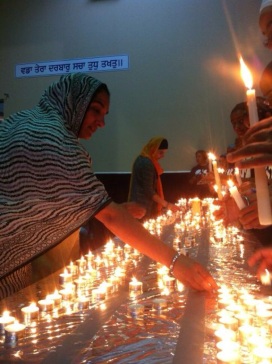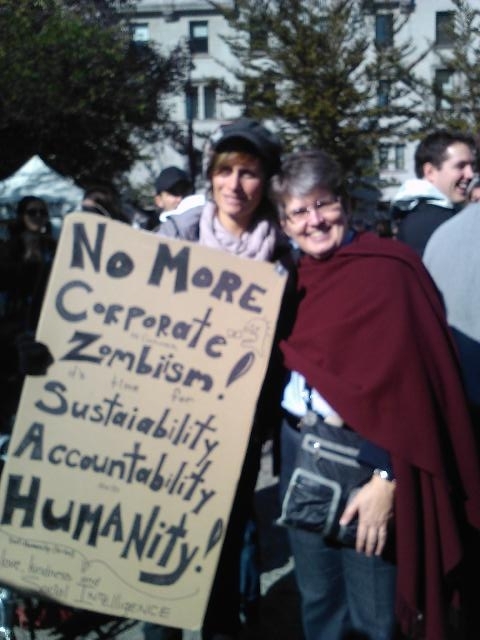Oh my mind remember God for he shall remove all the sufferings…
As I read this english translation of the lyrics of “the Song of Bliss” projected on the overhead screen at the Candlelight Vigil at the Guru Nanak Sikh Gurdwara in Surrey, BC my own mind couldn’t help but think of parallels in the Jewish-Christian Bible, especially in the Book of Psalms:
Oh my soul, bless the Lord ...who heals all thy diseases…and forget not all his benefits…. (Psalm 103)
 Women light candles at the August 7 prayer vigil at the Guru Nanak Gurdwara in Surrey for the vicitms of the mass shooting of six Sikhs at the Oak Creek Gurdwara in Wisconsin on August 5. Photo credit – Sikh Community of BC on Twitter, @BCSikhs Another phrase from the Sikh scriptures, “…His caste is casteless” evoked for me the egalitarian God of the New Testament for whom:
Women light candles at the August 7 prayer vigil at the Guru Nanak Gurdwara in Surrey for the vicitms of the mass shooting of six Sikhs at the Oak Creek Gurdwara in Wisconsin on August 5. Photo credit – Sikh Community of BC on Twitter, @BCSikhs Another phrase from the Sikh scriptures, “…His caste is casteless” evoked for me the egalitarian God of the New Testament for whom:
There is no longer Jew or Greek, there is no longer slave or free, there is no longer male and female… (Gal. 4:28)
Earlier in the service, I was also struck by how the words offered by the president of the Gurdwara were not that different from what I would expect to hear from a Jewish rabbi or Christian pastor similarly charged with consoling the faithful in a time of tragedy. With gentleness and compassion Bikramjit Singh reminded us about human frailty and God’s merciful nature, and the need to practice forgiveness. While these similarities in no way erased the distinctives between my Christian faith and that of my Sikh hosts or between exclusive truth claims that may come into conflict with one another, my encounter in the Gurdwara with a merciful God who in freedom weaves through the sacred hymnody of both traditions, who exhorts us to compassion and forgiveness, and in whose eyes all are created equal spoke to me not of difference but of our common humanity. As a speaker at another candlelight vigil aptly said:
… our foundational desires, the things we wish for our families and the prayers we offer to heaven are so much more similar than they are different.
In spite of our common humanity it is still so easy to live inside a bubble sealing ourselves off from the perspectives and experiences of our neighbors. Although my work as a chaplain brought me into weekly contact with staff, clients and families from the South-Asian community I had never visited a Gurdwara before. Not knowing what to expect I naturally had felt a little anxious on my drive out to the prayer service. Normally at ease and “in the driver’s seat” navigating the spaces of home, work and church located inside my own personal bubble, as I drove through the gate of the complex, I now felt self-conscious as the conspicuous outsider asking for directions. Perhaps this reluctance to risk losing our usual sense of control when we step outside our comfort zone helps to explain why Christians were not present in greater numbers at the prayer vigil. Sadly, I suspect that an even a bigger factor is a theological barrier erected by some Christian churches and sects that prohibits their members from participating in the prayer services of other faiths, equating such services with “devil worship.” What is most disturbing about such harmful convictions is that they are adopted in blind faith without true knowledge and continue to spread like a virus infecting hearts and minds with fear of the dangerous “other”. Although speaking about walls of a different kind–those erected on the basis of class and ethncity–the following words of Rowan Williams apply equaly well to those who demonize their neigbors’ faith.
One [should] be wary about localizing the Devil, but [he is present] anywhere and everywhere that barriers are being reinforced between people.
There was a time when I was also wary of participating in the prayer services of another tradition for fear that such participation would somehow contaminate or compromise my own faith. As I acquired a healthier theology that makes room for my neighbor’s religious beliefs I discovered that my own faith is not weakened through interfaith encounters but strengthened. By allowing the sacred music, prayers and hymnody of the Sikh tradition to have an impact on me, my Christian worldview was was not threatened but enlarged. My experience of the sacred while praying with the Sikh community broadened the context in which I read and hear the texts of my own tradition. That context now includes sitting beside a young girl not more than eleven or twelve years old, who graciously answered my questions about her faith and who told me about the importance of Charhdi Kala, a spiritual discipline of cultivating a mindset that never despairs and refuses to be crushed by adversities. And it includes the poignant witness of men, women and children chanting, “waheguru, waheguru, God is good, God is good ” in the face of their grief and pain. Far from compromising my faith my Sikh brothers and sisters enriched it. To those who reinforce barriers by falsely labelling people as evil I ask, “Is not falsely labelling people as evil one of the characteristics of evil? Is it not the sin which nailed Jesus of Nazareth to the cross? In the face of hate and violence rather than build barriers or insulate ourselves in our bubbles we need to build bridges across our differences. In his comments on the social and spiritual benefits of dialogue between Sikhs and Christians Archbishop of Canterbury, Rowan Williams reminds us:
…that in a world of plural convictions and diverse communities, one of the most important things to which God calls us, is our willingness to take risk. Not just for own dignity and conviction, but for the dignity and the conviction of the other, the neighbor, the stranger…
Friends, What stops us from taking the risk to know people of other faiths? And to my Christian brothers and sisters something to ponder: In the wake of the recent attacks on different faith communities, what would Jesus do if he lived where you live now?

